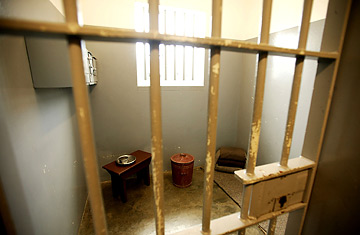
Nelson Mandela's former cell at Robben Island prison.
Tobie's young and affable, but his upbringing, his Afrikaans surname and the fact that I think I hear a racial undertone in a discussion we have about Cape Town car crime are enough to persuade me I'm probably dealing with someone nostalgic for the old days. That wouldn't make Tobie exceptional in white South Africa. I've been in the country less than a week and, just in the process of settling in, I've met several white racist real estate agents, watched agog as white housewives address the black staff in my local supermarket as though they were deaf simpletons and listened to a white farmer (who was also trying to sell me a car) describe Africa's decline from a beautiful and ordered continent ruled by whites to a vast pillaging zone for violent, inept, kleptomaniac blacks. What's most uncomfortable, perhaps, is that the racists often assume that as a white man, I'm one of their own. Worse, I imagine the black beggars at traffic lights and the crowds of black domestic workers I watch walk home every evening from my smart, white neighborhood do the same.
And then Tobie turns my own nascent anti-white prejudice on its head. We're approaching an intersection when, 30 yards ahead, a black security guard on a mountain bike suddenly catapults over his handle-bars. I pull over. His front teeth are broken off, there's blood coming from his nose, and he's rubbed the skin off the knuckles on his right hand. He's in shock, sitting on the road, dabbing at the gap where his teeth used to be.
Tobie grabs the guard's radio, calls the accident into the security firm headquarters and tells them their man needs a hospital. He lifts the bike off the road and, hand on the man's shoulder, tells him that the bike, which is rusty and worn, collapsed by itself and that he should complain to his bosses, perhaps even get some compensation. When the guard's colleagues take 10 minutes to show up, Tobie takes the radio again and berates them, and stays with the injured man until they finally arrive. Back in our car, he begins a long monologue about the scandalous working conditions security guards endure — poor pay, shoddy equipment and lethal danger — and the irony of black guards defending white homes from black thieves encouraged to take up crime by a wrenching inequality that continues to favor whites.
Tobie makes me feel pretty stupid. A little more than a decade after apartheid, you'd expect race to remain a huge issue in South Africa — and it is. There's still latent prejudice on both sides and the economic legacy of apartheid remains shamefully stark. But there's more to it than that. Tobie had been raised in the nucleus of apartheid. But that hadn't made him a racist, any more than being born black and poor would have made him a freedom fighter — and there were plenty of white South Africans of his father's generation active in the freedom struggle. Tobie is his father's son. But he's also from a new generation, and a new nation that confounds ideas often prevalent in the outside world that anything is ever as neat as black or white.
